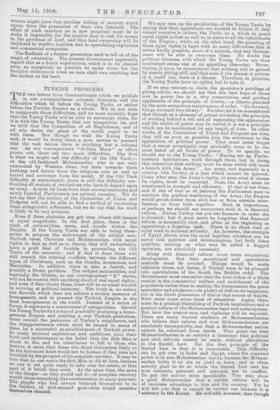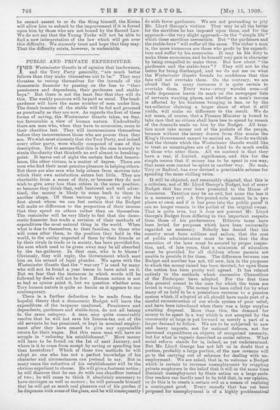TURKISH PROBLEMS.
PRE two letters from Constantinople which we publish J– in our correspondence columns illustrate well the difficulties which lie before the Young Turks, or rather before the Turkish Empire as fi whole. We do not wish to exaggerate those difficulties, and we most sincerely hope that the Young Turks will lye able to surmount them, for it is with the Young Turks that our sympathies lie, and we hold that the sympathies of all Englishmen, and of all who desire the peace of the world, ought to be with them. But though we wish the Young Turks well; it would be doiag them a poor service to pretend that the task before them is anything but a colossal one. As our correspondent " Golden Horn " in effect points Mat, there are two main difficulties. The first is What we might call the difficulty of the Old Turk;— of the old-fashioned Mohammedan who is not only untouched by Western ideas, but feels towards them loathing and horror from the religious side as well as hatred and contempt from the social. If the Old Turk difficulty is surmounted; there is still the difficulty con- fronting all makers of revolutions who have to depend upon an army. Armies let loose from their normal restraints and newly founded Parliaments are natural enemies.. We do not say that the leaders of the Committee of Union and Prdaress will not be able to find a method Of reconciling these antagonistic influences, but we do say that the work is likely to be very arduous.
Even if these obstacles are got over, others will remain of equal magnitude. In the first place, there is the clash of nationalities, races, and creeds within the Empire. If the Young Turks are able to bring them- selves to propose the endowment of the subject non- Turkish races, Christian and Mohammedan, with equal rights in fact as well as in theory, they will undoubtedly have a good deal of trouble in persuading the Old Turks of the necessity ; and if this is done there will still remain the internal conflicts between the different types of Christians, such as the Greeks, Armenians, and Maronites. In addition there is also a Jewish, and possibly a Druse, problem. The subject nationalities, and especially the Greeks, as out correspondent "Z." shows, will not be content with anything short of real equal rights ; and even if they obtain these, there will be no small trouble in arriving at political harmony. The truth is, no nation can flourish which does not achieve a certain 'measure of homogeneity, and at present the Turkish Empire is the least homogeneous in the world. Instead of a union of forces, it represents a concurrence of antagonisms. Shand the Young Turks find a way of gradually producing a homo- geneous Empire and creating a real Turkish patriotism, there remain the jealousies of Turkey's neighbours, and the disappointments which insist be caused in many of them by a successful re-establishment of Turkish power. So many national aspirations and ambitions have their birth and maintenance in the belief that the Siek Man is about to die, and his inheritance to fall to those who deserve it most, that these who think themselves likely to be the fortunate heirs would not be human if they were not troubled by the prospect of his complete recovery. It may be true that no one wants the Sick Man to die at once, because no one is yet quite ready to take °tor the estate, or that part of it which they covet. At the same time, the news of the danger—as they would call it—of complete recovery would cause something like consternation in many quarters. The people who had always believed themselves to be the holders of well-secured post-obits weak' Consider themselves cheated. We may sum up the perplexities of the Young Turks by, saying that their aspirations are doomed to failure if they cannot contrive to induce the Turks as a whole to grant, equal rights in fact as well as in name to all the inhabitants of the Empire ; while; on the other hand, the granting of those equal rights is beset with so many difficulties that it seems hardly possible, short of a miracle, that any Govern, moat will be able to overcome them. No doubt the political dilemma with which the Young Turks are thus confronted seems one of an appalling character. Never- theless, it must be remembered that nothing will be gained by merely tatting still, and that even if the chance of success is O small one, there is a chance. Therefore, in practice, the Young Turks have no option but to take it.
If we may venture to claim the spectator's privilege of giving advice, we should say that the best hope of those now in power lies in a very conservative and gradual application of the principle of liberty,—a liberty guarded by the most scrupulous maintenance of order. " Go forward; but go forward very slowly." Further, let it be remembered that though at a moment of actual revolution the principle of working behind a veil and of separating the appearance and the reality of power may be useful, it is not a principle which can be maintained for any length of time. In other words, if the Committee of Union and Progress are wise, they will as soon as possible join the substance to the appearance of political power. They must never forget that a secret sovereignty may gradually. come to be the • most hated of all forms of power. To be specific, we should say to the Young Turks : " Having set up Parlia- mentary institutions, work through them, but in doing this remember that nothing must be done which will cause a breach with the Army." An army, and especially in a country like Turkey; is a fact which cannot be ignored. Come what may, the Army's rights, or even what it deems its rights, must be respected. Next, the Army Must be maintained in strength and efficiency. if that is not done, and if but of fear or of jealousy the Parliament were to sanction the gradual weakening of the Army; the Empire would perish either from civil war or from outside inter- ference, or from both together. Next in importance, or perhaps we should say concurrent with it, is financial reform. Unless Turkey can put her finances in order she is doomed ; but it must never be forgotten that financial reform is necessarily slow, and often at the beginning in appearance a hopeless task. There is no short road or royal road to national solvency. As, however, the example of Egypt shows, even the most hopeless situation can be saved with patience and determination, but both these qualities, making up what may be called a dogged. optimism, are absolutely necessary.
Along with financial reform must come commercial development. But here sensational and • speculative methods must be avoided, Things would be made infinitely worse, not better, if Turkey were to be plunged into speculations of the South Sea Bubble order. The Government must remember that the true riches of a State consist in the commercial welfare and enrichment of the populaticin rather than in making the Government the great' speculator and projector,—in plenty of well-to-do' taxpayers, not in the direct possession of this or that source of wealth. Next meet come some forril of education. Again, there must be a gradual liberalising of Turkish institutions and a; gradual reform of the Mohammedan legal and social system. But here the utniost care and vigilance will be required. There are many learned students of Mohammedanism who believe that reform and true Mohammedanism are absolutely incompatible, and that a Mohainmedan nation cannot be reformed from inside. They point out that Mohaminedanism is so entirely is theocracy that political and civil refornis cannot be made without alterations in the Sacred Law. Yet the first principle of the Sacred Law is that it is immutable. This difficulty dau be got over in India and Egypt, whore the supreme power is iii non-Mohammedan hands; because the Moham- medan holds it no sin to' yield to force, and is often secretly 'glad to do So where the Sacred Law and his true interests, personal and national; are in conflict. To put the matter More specifically. You may show a good Mohammedan that it certain reform will be of imaionse advantage to him and his country. Yet hel will tell yen that it canna be carried out because it is cdatrary to the Koran. He wilt add, however, that though he cannot assent to or do the thing himself, the Koran will allow him to submit to the improvement if it is forced upon him by those who are not bound by the Sacred Law. We do not say that the Young Turks will not be able to find a new interpretation of the law which will get over this difficulty. We sincerely trust and hope that they may. That the difficulty exists, however, is undeniable.











































 Previous page
Previous page